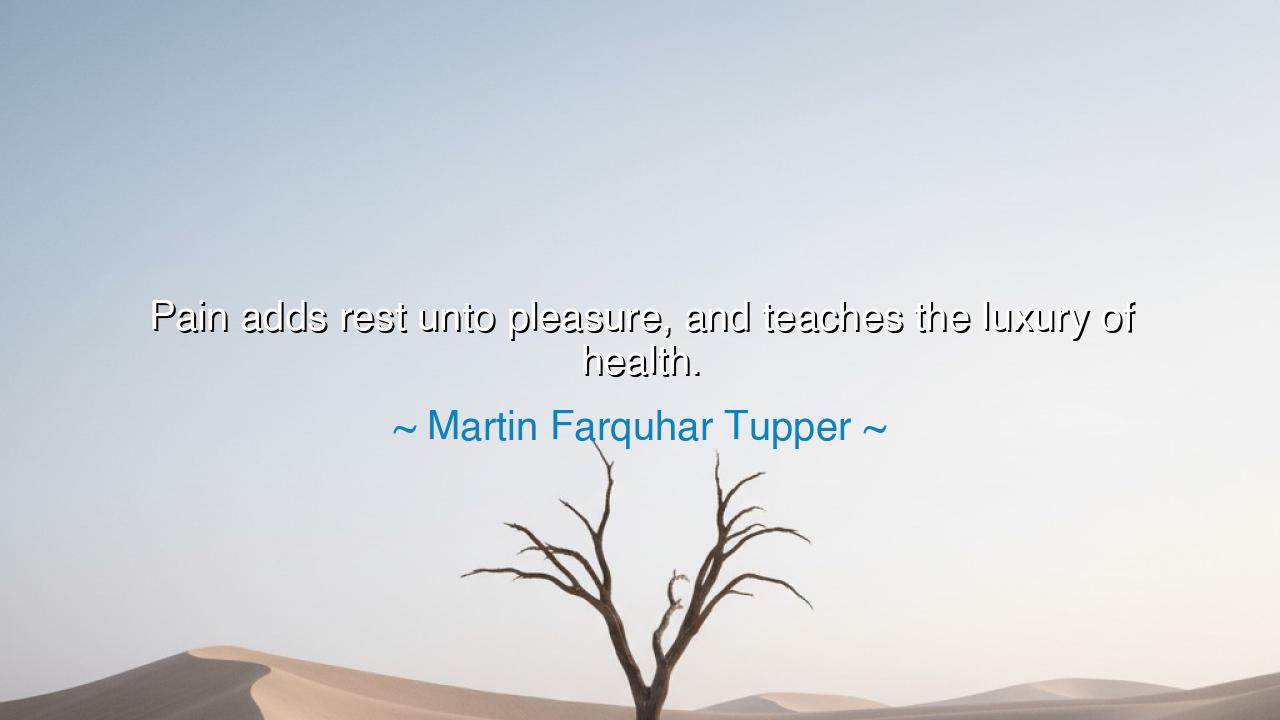
Pain adds rest unto pleasure, and teaches the luxury of health.






“Pain adds rest unto pleasure, and teaches the luxury of health.” Thus wrote Martin Farquhar Tupper, the Victorian poet and philosopher whose words, though simple, carry the weight of deep human wisdom. In this reflection, Tupper reveals a truth as ancient as life itself — that pain is not merely an affliction to be feared or despised, but a sacred teacher. It is through pain that we come to understand the sweetness of pleasure, and through illness or weariness that we learn to cherish the divine gift of health. His words speak not of suffering as punishment, but as a necessary counterbalance — the shadow that makes the light more radiant, the winter that gives meaning to spring.
From the dawn of thought, the sages and poets of the world have pondered the mystery of suffering. The ancients of Greece believed that those who never faced sorrow could never attain wisdom, for only through struggle does the soul awaken to understanding. The Buddha himself taught that life’s essence includes suffering — not to condemn us, but to guide us toward enlightenment and compassion. Tupper, writing in the 19th century, echoed this eternal truth in a world beginning to place its faith in comfort and progress. He reminded his readers that even amid prosperity, we must not forget the refining power of adversity, for without it, gratitude fades and the spirit grows dull.
When Tupper says, “Pain adds rest unto pleasure,” he reveals the hidden rhythm of life — that all joy is deepened by contrast. The one who has never known hunger cannot truly taste abundance; the one who has never been weary cannot savor rest. Even the sun itself would blind us if not for the cooling shadow of night. So too with human life: we learn to treasure peace only after turmoil, to value laughter only after tears. Pain, though harsh, is the sculptor of appreciation. It shapes the soul to receive joy more fully, for joy without its opposite becomes mere habit — unnoticed, uncelebrated, and soon forgotten.
“Pain… teaches the luxury of health.” In this, Tupper gives voice to one of life’s most profound paradoxes. Health, that silent companion we take for granted, reveals its worth only when lost. Ask the one who rises from a sickbed after long suffering — every breath feels like a blessing, every movement a hymn of gratitude. History, too, teaches this lesson. When Helen Keller, struck blind and deaf at an early age, learned to communicate through the hand of her teacher Anne Sullivan, her joy in understanding even a single word surpassed the pleasures of those who see and hear freely every day. Through loss, she found depth; through pain, she found purpose. So too can we, if we are willing to see beyond the surface of our trials.
Yet Tupper’s wisdom is not an invitation to seek pain, but to honor it when it comes. For pain is not the enemy — it is the messenger. It tells us where balance has been broken, where healing must begin. To flee from pain is to flee from the lessons it offers: humility, endurance, compassion, and gratitude. The ancients likened suffering to fire — it burns, yes, but it also purifies. The soul that endures pain with patience emerges tempered, capable of deeper empathy and greater joy. In this way, pain is not destruction, but transformation.
Consider also the life of Nelson Mandela, who spent 27 years in prison for his fight against apartheid. The pain of confinement could have turned his heart to bitterness, but instead it deepened his strength and softened his spirit. When at last he was free, he did not seek vengeance, but reconciliation. Pain had taught him the luxury of peace, just as sickness teaches the luxury of health. The prison cell became his forge, and through its fire, he emerged a man who could heal nations. This is the alchemy of suffering: when met with courage and wisdom, pain becomes not a chain, but a key.
The lesson, then, is clear and timeless: do not curse your pain — learn from it. When hardship comes, see it as life’s whisper reminding you of what is precious. When you are weary, rest with gratitude; when you are healed, live with awareness. Let your suffering refine you, not define you. For every shadow reveals the presence of light, and every wound, if tended with patience, becomes a source of strength.
So remember the words of Martin Farquhar Tupper, and let them guide your heart: “Pain adds rest unto pleasure, and teaches the luxury of health.” When you next find yourself in sorrow or illness, hold this truth close — that even in the depths of pain, life is teaching you how to live more fully, to love more deeply, and to rejoice more purely in the moments of health and peace. For in the great balance of existence, pain is not the end of joy — it is its beginning.






AAdministratorAdministrator
Welcome, honored guests. Please leave a comment, we will respond soon